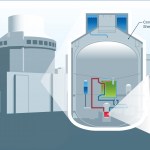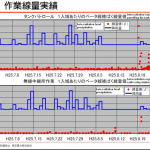nuclear energy
It is hard to get very far into a discussion of non-fossil fuel energy, and the energy transition, without someone coming along and yammering about nuclear energy.
Now, don't get me wrong. I'm all for inexpensive and safe nuclear power and for building nuclear power plants that promise to eat up all the waste, do not create any more waste, are totally safe, are affordable, are efficient, don't require the equivalent of slave labor to mine the uranium, and are cost effective. Bring it on!
But the nuclear industry is generally troubled by the fact that this list of promises is not possible…
A few scientific papers are retracted after they're published, such as this analysis of nuclear energy that appears to have been nixed for poor methodology and bad numbers on Stoat. William M. Connolley adds that because of the politics surrounding nuclear power in Europe, "this crude level of analysis would be unlikely to be useful." But on Respectful Insolence, Orac looks at an anti-vaccine abstract that was so awful the publisher decided to take it down before the paper could be published. Orac writes, "basically, this paper is crap, so much so that even a predatory open access publisher…
Fukushima Update #70: If you can't measure it, you can't analyze it.
by Analiese Miller and Greg Laden
It has been suggested, by various commenters on the internet, that the problem with Fukushima is not that there is a dangerous radioactive mess there, but rather, that the authorities in charge have decided that exposure to radiation is dangerous, when it really isn’t. The argument has been made that the evacuation of the region around Fukushima at the time of the meltdowns and explosions was unnecessary. This presumably also means that the exclusion zones, where people are not allowed to…
As things unfold, there will be more to say about the terrible situation in Japan and its effects in the both the present and the future, but for now, Nicole Foss (aka Stoneleigh in her super financial analyst extraordinaire identity, and nuclear safety expert...is there anything she can't do?) of The Automatic Earth has done a superb review of what we know, what we don't know and the consequences we can anticipate. Very, very important! The comments at The Oil Drum are also often quite valuable. I think particularly useful is her evidence that this was not an unpredictable "black swan"…
Me again. I once put up a post on the problems with trusting the safety of energy producing systems. The post was not well received; I see as I re-read the comments that I was particularly irritable about it. But I find the point I was trying to make way back when captured better in the editorial cartoon below:
In his State of the Union speech last week, President Obama called for significant government investment in nuclear energy, telling Congress that "to create more of these clean energy jobs, we need more production, more efficiency, more incentives. And that means building a new generation of safe, clean nuclear power plants in this country." The declaration brought members from both parties to their feet with some of the strongest applause of the evening (video above.)
This week, as the NY Times reports, the Administration in its proposed budget plans to triple the size of the Energy…
Mike the Mad Biologist points me to an interesting article in Wired, Uranium Is So Last Century -- Enter Thorium, the New Green Nuke. Of course Wired is a booster of many things which never take off, but in general I think it's probably safe to bet on nuclear power becoming more prominent in the near-to-medium-future. I recently have been reading a bit about oil, stuff that's not written by Daniel Yergen, and was fascinated by this chart of long term crude prices:
The inflation adjusted values are of interest. But look at the lack of volatility before 1974! My whole life has been…
Matt Springer of Built on Facts has a post up where he defends the potential of nuclear power. Regular readers of this weblog will know that I am broadly sympathetic. I understand that the "atomic age" is not going to be a utopia by any means nor will it solve all our problems, I do have a suspicion that much of the opposition is driven by the wisdom of repugnance.
I've surveyed attitudes toward nuclear power in the GSS before, the NUKEGEN and NUKEFAM variables asked people in the early 1990s how dangerous they thought nuclear power was to their family or the environment. There were five…
Yesterday in my review of the recent Pew survey comparing attitudes of scientists and the general public I emphasized the fact that scientists are disproportionately godless liberals. But there are some issues where it seems that the Left is on the forefront of science-skepticism. There has been talk here on ScienceBlogs about the disproportionate Lefty orientation of anti-vaccination activists. From what I can tell this is true, but anti-vaccination sentiment is too shallow of a sentiment for it be starkly political, at least according to these data (there's little party difference). On the…
Last week, John Holdren appeared for a 45 minute interview on NPR Science Friday with host Ira Flatow. Below the fold, I have pasted excerpts of his comments relative to climate change policy options as well as investment in nuclear energy. In the interview, Holdren also had the chance to elaborate on his past comments on geo-engineering. Here's what he said:
FLATOW:...Let's talk a little bit about - back to energy a little bit and in global climate change. I know you've been in the press a lot, in the media a lot, talking about geo-engineering as something that is - you were quoted as, "…
A new study at the journal Risk Analysis examines the factors shaping public perceptions of nuclear energy and provides important clues about how to effectively mobilize public support for expanded investment in the technology. (See end of post.)
The study analyzes data from 1997, but the relative stability in public attitudes about nuclear energy and the strong measurement in the study of core constructs such as risk perceptions, environmental values, and nuclear attitudes make the findings still relevant.
Not surprisingly, according to the analysis, basic value orientations--including…
These offer another set of landscape images (here were some others: one; two), these punctuated by the contrast of nuclear sky, horizon, and military maneuver. I saw them at this site, though that site was reposting images from the book How to Photograph an Atomic Bomb, by Peter Kuran. The Cal Lit Review site says this by way of couching the images:
Between 1945 and 1962, the United States conducted over 300 atmospheric nuclear tests above the ground, in the ocean or in outer space.
On August 5, 1963, the United States and the former Soviet Union signed the Limited Test Ban Treaty,…
In a time of increasing concern for water quality and availability, nuclear power facilities require enormous quantities of water and put back effluent into those nearby water sources. At a time of carbon counting, they also generate considerable carbon emissions through the process of construction and with the life-cycle chain of fuel (uranium) mining, milling, transporting, and disposing. As Americans relearn the breadth of what an environmental issue is, nuclear plants all the while create new social and cultural problems for community stability and autonomy. Coal-fired plants quite…
Think that America's energy problems and high gas prices aren't changing perceptions among independents, even among liberals? Think again. According to a new Pew survey, as many liberals (45%) as conservatives (48%) now believe that energy exploration - including mining and drilling, as well as the construction of new power plants - is a more important priority for energy policy than increased conservation and regulation. Among liberals, it's an unheard of 23 point shift in preferences since just February of this year and as depicted at left, there's been a 15 point shift among moderates.…
Circa 1976, an editorial cartoon from Bill Mauldin. File this under "everything old is new again"?
And, we'd need 10 dumps the size of Yucca Mountain "to store the extra generated waste by the needed nuclear generation boom." (Full story through Reuters here.)
This from a new report commissioned by the non-profit Keystone Center (whose website was giving me link trouble before, but the final report itself should be here, as a *.pdf).
"Historical and Projected Commercial Spent Nuclear Fuel Discharges as of May 14, 2007" (from Keystone report linked above, with apologies for the poor quality reproduction/blurriness/squinting requirement)
That report, called "The Nuclear Power Joint Fact-…
Environmental justice and the local conditions of energy production facilities: some of the most significant reasons to be concerned about the recent enthusiasm for new nuclear power facilities.
Oil production and distribution in non-western locales is environmentally destructive. Why do we think nuclear facilities in non-western locales will be any better?
"Oil leaves its mark in Okrika, from a company umbrella to a trail of pipelines coiling through town. Since oil started flowing, most communities have seen living standards fall, betraying the hope that oil once brought to Nigeria…
In a column last year, I detailed the historical trajectory in the U.S. of frames on nuclear energy, with images moving from very positive interpretations centered on social progress and economic development during the 1950s and 1960s to a very negative focus on public accountability and a Pandora's Box of unknown disaster in the 1970s. These frames were locked in by the Three Mile Island accident in 1977, and reinforced in the 1980s by the Chernobyl disaster. Since TMI, no new nuclear reactors have been built in the U.S., and public support for nuclear energy has never moved above 50%.
Yet…
(Thanks to Steven Starr, at the Energy Justice Network, from whom I got most of this.)
This is all strange to me. The January/February 2007 edition of the Bulletin of the Atomic Scientists says (on page 71): "Major progress towards a safer world would include engaging in serious and candid discussion about the potential expansion of nuclear power worldwide. As a means of addressing the threats from climate change, nuclear power should be considered as an alternative energy source." They also say that "nuclear energy production does not produce carbon dioxide."
They don't say anything about…




